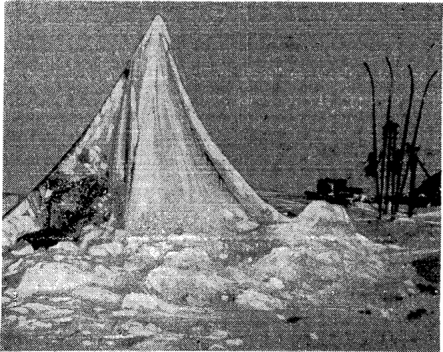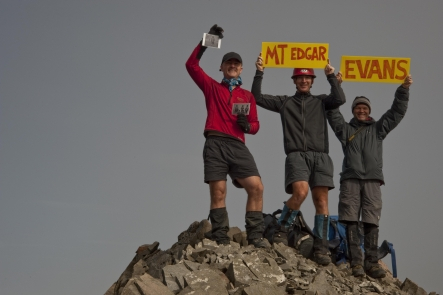Scott’s Last Journey

The tent containing the bodies of Scott, Wilson and Bowers, as it was found eight months later. (Image published in the Evening Post, 26 September 1938, Alexander Turnbull Library)
On 29 March 1912, Captain Robert Scott wrote his last diary entry, after a week of continuous gales had forced him and his two remaining companions to camp only one day’s march away from their food depot. “We had fuel to make two cups of tea apiece,” he wrote, “and bare food for two days on the 20th. Every day we have been ready to start for our depot 11 miles away, but outside the door of the tent it remains a scene of whirling drift. I do not hope that we can hope for any better things now. We shall stick it out to the end, but we are getting weaker, of course, and the end cannot be far. It seems a pity but I do not think I can write more. For God’s sake look after our people.” More than six weeks earlier, on 17 February 1912, Petty Officer Edgar “Taff” Evans had collapsed and died. The tallest of the five expedition members and once considered the strongest, he had helped pull the sledge until his last day. His physical deterioration was slow and his mental condition worsened, probably as a result of a fall which concussed him. By the time Scott ordered him to unhitch from the harness, he was unable to walk and died that night. Scott wrote in his diary that “the safety of the remainder seemed to demand his abandonment, but Providence mercifully removed him at the critical moment.” A month later, on 16 March, Titus Oates asked to be left behind in his sleeping bag. Badly frostbitten and utterly exhausted, he knew he would not make the journey back, but his team mates persuaded him to march on. Scott was aware that Oates was close to death, and described his as a brave soul, who would not give up hope to the very end. He went to sleep hoping not to wake up in the morning. When he did, it was blowing a blizzard and he walked out of the tent with the now famous words: “I am just going outside and may be some time.” During their last weeks, Scott, Bowers and Wilson endured extremely low temperatures, down to minus 40 degrees Celsius even during daytime, and ice surface conditions that caused friction on the sledge runners. All suffered from frostbite and exhaustion and were near starvation, managing no more than a few kilometres each day. Although Wilson had earlier agreed to give each of them enough opium or morphine to end their lives, they decided to die naturally. Scott wrote “we shall march for the depot with or without our effects and die in our tracks.” Their bodies were found eight months later. Wilson and Bowers were huddled in their sleeping bags, while Scott had thrown back the flaps of his and opened his coat.

Image courtesy of Shaun Barnett
On 17 February 2012, three mountaineers reached the summit of an unnamed peak in the Polar Range in Arthur’s Pass National Park to commemorate Edgar Evans on the centenary of his death.
Shaun Barnett (left), Steve Baker and Fraser Crichton (right) climbed the 2019m peak, between Mts Wilson and Bowers, and toasted him with a swig of single-malt Scottish whisky and left two pictures of him under a cairn on the summit. Following the loss of Scott’s polar party, the Polar Range was named, with three significant peaks commemorating Bowers (1,891 metres), Scott (2,009 metres) and Wilson (2,035 metres). A fourth peak on the adjacent Aicken Range is named after Oates (2,041 metres), but so far none acknowledges Evans. The mountaineers hope that the New Zealand Geographic Board will grant their forthcoming application to name the peak Mt Edgar Evans.

